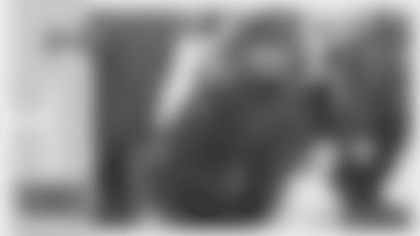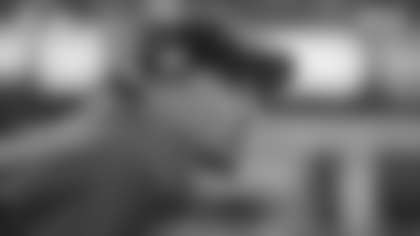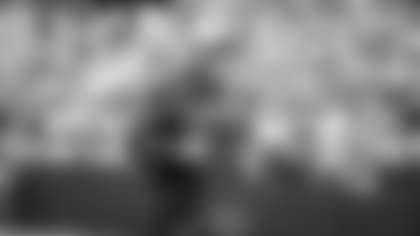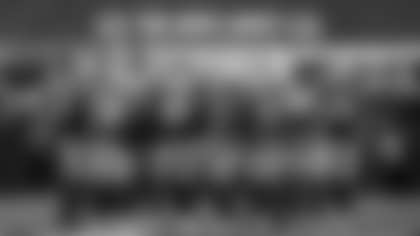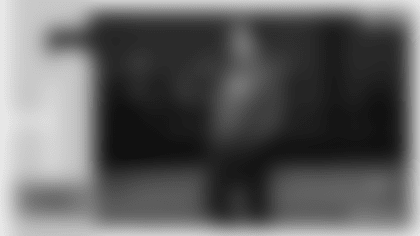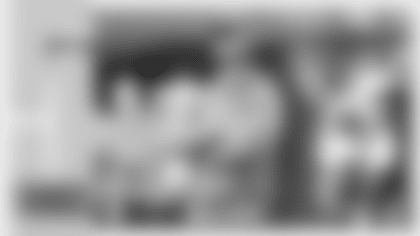Red Cochran spent 42 years working for the Packers as an assistant coach and scout. Cochran served as Vince Lombardi's backfield coach from 1959-66 and then as Dan Devine's backfield coach from 1971-74. He was a college scout from 1975-2004. Cochran also played for the Chicago Cardinals from 1947-49. He began his NFL coaching career with Detroit from 1956-58. Cochran was inducted into the Packers Hall of Fame in 1997. This is the first of a two-part oral history.
On his trips to Green Bay in 1947 for a league game and in 1950 for an exhibition game when he was playing for the Chicago Cardinals: "I remember when we got off the train, we walked to the hotel. Another memory of Green Bay was that when we came on my first trip, I was running around with Bill Blackburn and Buster Ramsey. They had kind of taken me in tow. We walked to the hotel and the first thing they said was, 'Throw your bag down, we're going somewhere.' So I threw my bag down on the middle of the floor and we went to Chili John's. Of course, I never came back again when I didn't make the same trip."
On playing in City Stadium: "You never played a game where you didn't have to jump that (white, single-rail) fence (inside the track) or slide under it. It was so close to the sideline, you had to be aware of it."
On whether there was a visiting locker room at City Stadium: "We dressed at the hotel, took a bus to the stadium and then returned to the hotel after the game to dress."
On playing for Curly Lambeau in 1950: "By then, I think football had passed him by. He wasn't up on the T-formation. My real memory of Curly is that he wrecked my career. I have no love for him. I injured my knee in an exhibition game in Des Moines and (the Cardinals) went to the West Coast after that. I saw one of the country's leading orthopedic surgeons out there who recommended surgery, but Lambeau wouldn't allow it. I practiced all year with torn cartilage, but I wasn't healthy and couldn't play."
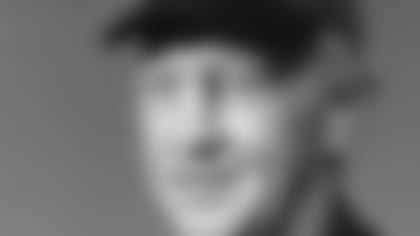
On encountering Lambeau after joining Lombardi's staff in Green Bay: "The four new (assistant) coaches got together and went to the Stratosphere one night for dinner. There was only one wife in town at the time; Bill Austin's wife was here. So we were sitting at a table and Curly walks in and went to the bar. The other three coaches all knew him and went up to the bar to meet him. I stayed at the table and he eventually came over and said, 'Red Cochran, what's wrong with you? I always got along with all my players.' I said, 'Curly, you're the son of a (buck) who wrecked my career. Now, get away and leave me alone.'"
On whether he had any other encounters with Lambeau in Green Bay: "My wife recalls that one time we were downtown ready to make a left turn and he walks across the street. Some lady had to stop so he could get across the street. My wife just about jumped out of the car when I rolled the window down and yelled, 'Run over that son of a (buck).' So I hated his (butt)."
On being hired by Lombardi: "I was fired in Detroit and had talked to Red Hickey about joining his staff in San Francisco. But a sportswriter in Detroit – I can't remember his name – had met me at a golf outing and he said he had gone to school with Lombardi. I called him and informed him Lombardi had been hired in Green Bay. The writer told me that he had called Lombardi to congratulate him on getting the Green Bay job and mentioned that I was available. So he said, 'Be alert for a phone call.' Sure as hell, about an hour later Vince called me. He was on his way from New York to Green Bay, but had to change planes in Detroit. He asked me if I could meet him at the airport to interview me. I interviewed for the job at the airport between planes. This was on a Tuesday and he said, 'Don't do anything until you hear from me, but if you have other interviews, go ahead.' He called me back on Friday and said, 'Are you still interested in coming to Green Bay?' I said, "Yeah.' He said, 'When can you be here?' I said, 'Monday.'"
On working for Lombardi: "He could show patience when he had to, but it wasn't his forte. When he got on one of his tirades about people not putting out or not doing the right thing, he made it sound so personal and people took it that way, even though he might not have singled out a single person."
On his arrival in Green Bay: "I checked into the YMCA and that was where I stayed. The first day, Phil (Bengtson) and I had breakfast together and walked down Washington Street to the office. The big sign there – I guess it was at the corner at Cherry (Street) – said a minus 23 degrees. I said, 'What the hell we doing here Phil?'"
On Lombardi's early meetings with his coaches: "Once we got here as a staff, we started having meetings and it was just like being a player. He was on the blackboard, explaining things and doing the same things he'd do in front of a group of players in a room. It was a question of him teaching us what he wanted us to teach the players."
On what the coaches saw from their film study of the 1-10-1 1958 Packers: "We didn't see the potential of many of the players. (Paul) Hornung was shuttling around at different positions. (Jim) Taylor wasn't playing. Ron Kramer was in the service. (Ray) Nitschke wasn't playing. (Jim) Ringo was the center. We knew we had a good center."
On Lombardi's offense: "The running game was built around what he called Red Right 49. The red was the formation with a wide split between the backs. His version of the (power) sweep was different than what we ran in Detroit with Buddy Parker. The way (Lombardi) wanted it done was the same thing he had done in New York."
On the specifics of Lombardi's power sweep: "The tight end was the key and we had a great one in Ron Kramer. I've always said that Ron Kramer deserved as much credit for the success of the sweep as (Fuzzy) Thurston and Jerry Kramer. The key block for the Packer sweep was the tight end on the linebacker. The tight end took a nine-foot split, which was almost double what the tight end would take in a normal alignment. So the linebacker over him had to move out and open up a gap between him and the defensive end. The tight end's assignment was to handle that linebacker. If the linebacker tried to step to the outside to cut off everybody getting outside him, the tight end moved him on out and everybody cut inside. If the linebacker tried to come across the tight end to jam the play, then the tight end drove him down the line and the play went outside. Most teams didn't believe you could split a tight end that wide and have him be effective as a blocker. That's why Kramer was so valuable."
On other key blocks on the power sweep: "Forrest Gregg was the tackle next to the (tight) end and his assignment was to slam into the defensive end and then turn inside for the middle linebacker. When he slammed into that end that set up the fullback's block. He blocked that defensive end. If the maneuver by the tackle to set up the fullback worked and Ron (Kramer) moved the linebacker to the outside there was a big hole just outside the defensive end. Forrest had the middle linebacker, and he was young and quick and fast, so he was able to make that hit. That slam and seal. And Vince was the one who believed in that blocking scheme."
On whether Lombardi ever gave thought to Paul Hornung playing quarterback, his college position: "I don't think so. Because Hornung could pass, I think (Lombardi) envisioned him stepping right into (Frank) Gifford's place. When I was at Detroit, one of the first assignments Buddy Parker gave me was to look at some film of Gifford playing against the Lions. Gifford was a gifted athlete and I remembered the ability he had. Then when you saw Hornung, you knew he could step into that role. The threat of that pass on the sweep was always there. I think that was one of Vince's key thoughts with Hornung. If they started forcing that (sweep) too quick, you had to pass. And Hornung was a good enough passer to make it work."
On Hornung's running ability: "I think Gifford was faster, but (Hornung) moved well and could find a running lane and lean and make his way into it. He couldn't make those instantaneous moves, but he could find his way through traffic."
On Hornung as a blocker: "He was big enough and there wasn't much size differential between him and those linebackers. Hornung was bigger than Taylor. (Hornung) was hard-nosed. He was a good ballplayer, the best guy I ever coached."
On Hornung as a goal-line runner: "I think as much as anything it was the play. We ran a trap. It was one of our big plays. We didn't have to go very far and it wasn't going to be a big hole. The linebacker was pretty much always going to be there. But with (Hornung's) size and the way he hit the hole – he hit it quick – the scores just came. It was a 41 trap. The center would block to his left and Thurston would trap the tackle in front of Kramer."
On Taylor: "Taylor's running was like playing a pianola. Chit, chit, chit. Whichever hole was open, he'd hit it just quick. He was very quick. Strong as an ox. He ran through tackles, ran over people. Good balance. He could move laterally and pop through a hole without losing any speed. His whole key was his quickness and his strength."
On Taylor's best play if Hornung's was running the power sweep: "(Taylor's) bread-and-butter play was a slant to the weak side. We ran it mostly to the left, but also to the right. Vince's blocking scheme was for the tackle to block the defensive end and the halfback to block the linebacker. Taylor just picked the hole: possibly inside the tackle's block, possibly between the tackle's block and Hornung's block, and possibly outside Hornung's block."
On Lombardi's passing game:"We didn't have anything special in the passing game. Bart (Starr) was a patient passer. He was able to stand back there and face the rush. He was smart and could read the defenses and figure out where the receivers had to go. He didn't have a real rifle for an arm, but he was accurate enough. He put the ball where it should be put."
On the quarterback competition in training camp in 1959:"I don't recall (Babe) Parilli doing much to impress Lombardi. We liked (Joe) Francis' athletic ability and we didn't consider (Lamar) McHan merely a stopgap. I don't think (McHan) was a take-charge guy, but he was a pretty good athlete. If you gave him the job and left him in there, he probably wasn't going to disgrace you. But he had some bad times."
On Starr eventually winning the job in the fifth game in 1960: "We played Pittsburgh and McHan had a bad start. Vince put Bart in. He had a good game and we won the game. On the plane home that night, Vince said, 'Red, go on back and talk to McHan and don't let him quit because we'll still need him.' I talked to McHan and he said, 'Well, that's it. I'm probably through.'"
On whether Tobin Rote would have been Lombardi's quarterback if the Packers hadn't traded him in 1957 to Detroit, where Rote led the Lions to victory in that year's NFL Championship Game:"Vince would have had a tough time with Tobin. I coached (Rote) in Detroit. He was a real ego guy. He thought he could do anything. Hell, if he would have made up his mind to block, he might have been better at left halfback than Hornung was. He was a great football player. But he did things on his own. With him and (Bobby) Layne there that year I was in Detroit, a game plan didn't mean a thing. Whichever one started, when the next guy came in, he was going to score a touchdown quicker than the other guy."
On fullback Howie Ferguson, a six-year veteran and future Packers Hall of Famer cut in Lombardi's first camp: "I think he was part of that band that Vince wanted to get rid of, the guys who had been losing. He kept only a few established players – (Jim) Ringo, (Bobby) Dillon, (Dave) Hanner, (Bill) Forester – and then mostly young vets and new acquisitions. Ferguson probably thought he could still play and maybe resented not being given a starting spot."
On Alex Hawkins, who was cut despite being the Packers' second-round draft pick and wound up playing nine years for the Baltimore Colts: "He was a hotshot. He came in with a great reputation and thought because he was a high draft choice that he had it made. He'd goof off and screw up. I think he was playing defense. I don't remember him being in my group."
On three other rookie running backs who didn't make it in 1959: Tim Brown, who finished his career as Philadelphia's second all-time rusher; Dave Smith, the fourth-leading rusher in the AFL in 1960; and George Dixon, a Canadian Football League Hall of Famer: "I remember when Tim Brown got cut. We were working on handoffs – no line – and Tim Brown fumbled the ball and Vince said something to him. Like the very next play, (Brown) came back and fumbled another one and the ball ricocheted up and he kind of stumbled trying to get back to the ball. Vince was standing there and saw the whole episode. He just said, 'Get out of there.' And hollered for Bill Butler. Bill Butler had been working as a defensive back, but he came up and took Tim Brown's place. I think (Lombardi) cut Tim Brown the same week. I vaguely remember Dixon. He might have been smaller and a scat-back type, who maybe couldn't have handled the blocking. I don't remember Smith, but he, too, might have been too light."
On all-purpose veteran back Lew Carpenter: "He was a super athlete. He became the third quarterback when Francis got hurt."
On players who didn't toe the line under Lombardi: "Ray Nitschke and Bill Quinlan ran around together, and the two of them got in more trouble than the whole rest of the ball club. Quinlan and Nitschke went down to a bar on Broadway one night, and two merchant sailors beat the (crap) out of (Quinlan). They threw Quinlan in a box car and shut the door."
On halfback Tom Moore, the Packers' first-round draft pick in 1960: "I think he would have been a first-stringer with anybody else. Excellent hands. He took Taylor's place at times. He could block. He was a good ball-carrier."
On halfback Elijah Pitts, a 13th-round pick in 1961: "The thing about Elijah was that he was so fast, he'd outrun those guards. It took him awhile to learn that he had to give those guys a chance to make those plays. But he was fast. Not just quick. He could really fly."
On the Chicago Bears edging the Packers by a half-game in 1963: "Billy Wade threw all those dink-and-dunk passes (for the Bears). And Billy Wade was the kind of guy that after he threw all those passes, he had his passing percentage figured out before he went in the huddle. That's all he was thinking about: those little completions he was getting. He was not a good, strong passer. But we lost Hornung in '63. The main thing it took away was his leadership. Paul was consistent. You could always count on Hornung to gain something. We might have had control of the ball longer with Paul in there."
On Starr missing four games with an injury in '63 and being replaced by John Roach:"That was a drop-down. Bart was a consistent passer and didn't throw interceptions. Roach wasn't the same caliber of quarterback."
On Lombardi then acquiring Zeke Bratkowski to replace Roach as the backup: "Zeke probably had as strong an arm as there was in the league at that time. Very few people could throw the ball as well as Zeke."
On Cochran quitting after the 1966 season and going into business: "I lost some of my enthusiasm and I sensed Lombardi wouldn't coach much longer. I never had any trouble with him. I had one flare-up with him in my whole time here. Hornung screwed up on a play and Vince jumped on me: 'Red, how come you don't go over this stuff?' I knew I had gone over it, but I just backed away. When we came up to the dressing room, I said, 'Coach, don't ever jump me again like that on the field. You (darn) well know I went over that and Hornung just screwed up.' (Lombardi) didn't say a word. He just got up and walked out of the room. But that had nothing to do with me leaving."
Cochran died in 2004 at age 82. The excerpts above were taken from interviews conducted in 1996, 2002 and 2003.
- *




